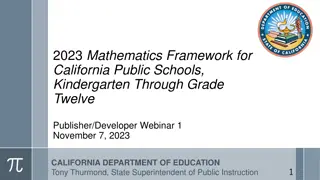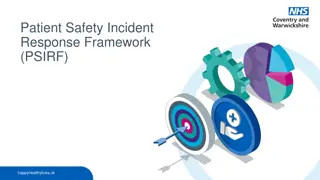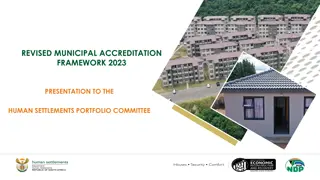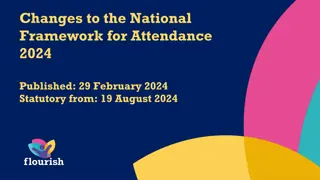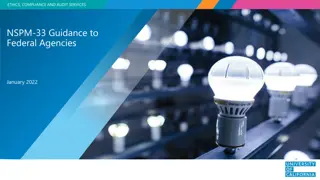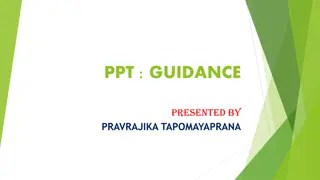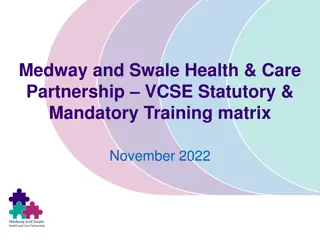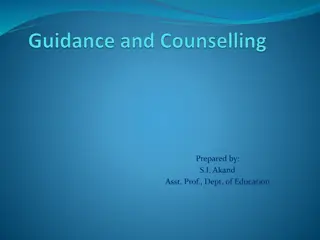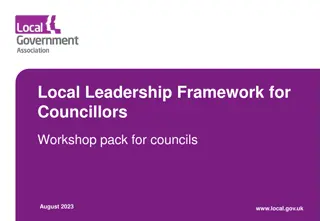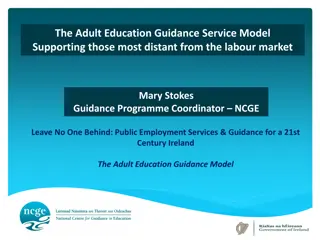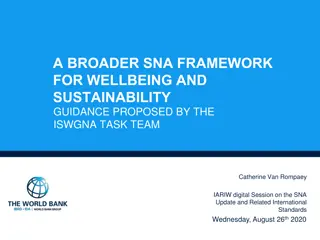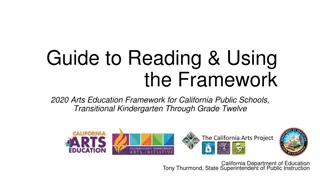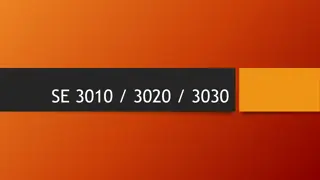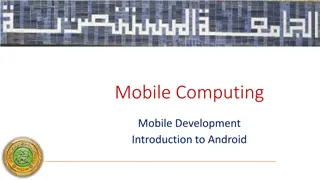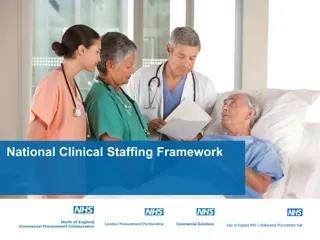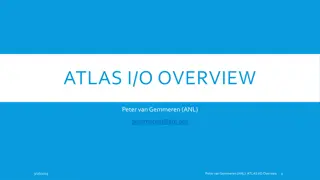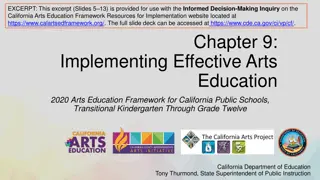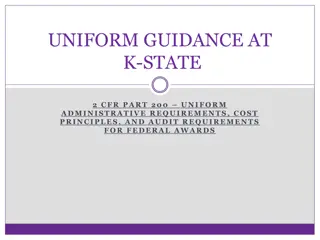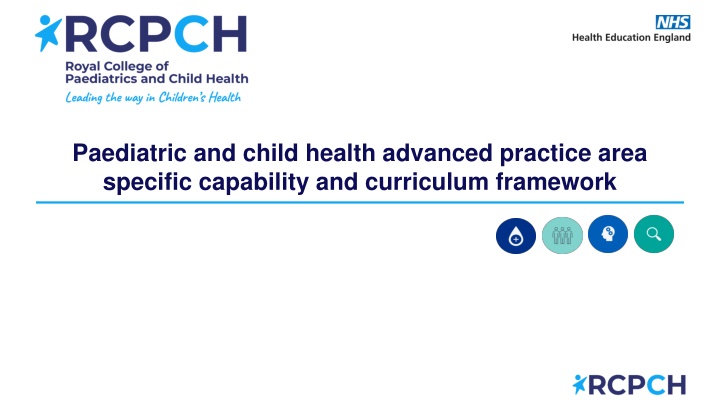
Paediatric & Child Health Advanced Practice Framework
Explore the recommended framework for Advanced Clinical Practitioners (ACPs) in Paediatric & Child Health, aligned with NHS England and RCPCH standards. This comprehensive guide covers core knowledge, skills, clinical supervision, and assessments to ensure competence in caring for infants, children, and young people.
Download Presentation

Please find below an Image/Link to download the presentation.
The content on the website is provided AS IS for your information and personal use only. It may not be sold, licensed, or shared on other websites without obtaining consent from the author. If you encounter any issues during the download, it is possible that the publisher has removed the file from their server.
You are allowed to download the files provided on this website for personal or commercial use, subject to the condition that they are used lawfully. All files are the property of their respective owners.
The content on the website is provided AS IS for your information and personal use only. It may not be sold, licensed, or shared on other websites without obtaining consent from the author.
E N D
Presentation Transcript
Paediatric and child health advanced practice area specific capability and curriculum framework
Content Introduction Core knowledge and skills Intentions for use Clinical supervision Clinical supervision standards Demonstrating capability and competence as an ACP Supervised Learning Events (SLEs): Workplace-based assessments, key terms & descriptors Assessment requirements Aligned with RCPCH core level training requirements Schematic overview of PCHCF components PCHCF Domains Domains 1 11; with learning outcomes and key capabilities Illustrations Illustration page references Portfolios of evidence Reference sources
Introduction This document sets out the recommended framework for the development of Advanced Clinical Practitioners (ACPs) working with infants, children and young people (ICYP). It establishes guidance on how Paediatric ACPs will demonstrate their capabilities in practice and is mapped to the NHS England (NHSE) Multi-professional Framework for Advanced Clinical Practice in England, and aligned with the Royal College of Paediatrics and Child Health (RCPCH) Paediatric and child health advanced practice area specific capability and curriculum framework, which was adapted from the RCPCH s Progress and Progress+ Curriculum. The framework is structured around 11 Domains designed to cover the broad and core scope of professional practice in paediatrics, each with specific learning outcomes and key capabilities to achieve and demonstrate, which can then be met through illustrations and competencies to support the needs of the full range of children s clinical services.
Core knowledge and skills This framework is intended for use by trainee ACPs (tACPs) who are undertaking the MSc ACP or MSc ACP apprenticeship; or existing ACPs in substantive posts who previously completed an approved HEI Level 7 course in Advanced Decision-making should form the basis of an e-portfolio. It is underpinned by Level 7 master s academic study, with all ACP s evidencing core training modules including Advancing Professional Practice, Advanced History Taking and Physical Assessment and Diagnostic Reasoning/Clinical Decision-making modules; and (where applicable) Non-Medical Prescribing (NMP). From 2017 onwards, all tACPs should have completed the MSc ACP pathway in full. The structure of this framework and its domains are built upon the expectation of an existing foundation level of knowledge and skills relevant to paediatrics and child health through the professional s primary professional registration and undergraduate training, and should be demonstratable with the core modules listed on higher education institution (HEI) programme transcripts or evidenced in the practitioner s portfolio, via their employment history, and reviewed with the ACP s Clinical and/or Education Supervisors.
Intentions for use This framework is not intended for use by tACPs or ACPs with existing validated professional body curriculums relevant to their service, who have existing portfolio platforms in use (e.g. RCEM Paediatric Curriculum with the RISR eportfolio, or FICM ACCP in Critical Care areas), or those working towards other HEE specified credentials for the NHS England s (NHSE) Centre of Advancing Practice. Until any specific RCPCH or NHSE e-portfolio platform for tACPs is developed, trainees should begin to populate a portfolio within their role linked to these domains, in order to meet the curricular requirements and those of their individual clinical service whilst training. This will ensure quality assurance and governance for the trainee, patient, service and organisation, and support more rapid credentialing with NHSE (when available); alongside demonstrating evidence of structured learning through service specific workplace assessments, resulting in robust evidence of capability and clinical competency to transition to, and perform in, the ACP role. For more information on the NHSE Centre for Advancing Practice and Multi-professional Advanced Clinical Practice Framework see: https://advanced-practice.hee.nhs.uk
Clinical supervision The trainee must have a named Co-Ordinating Educational Supervisor (Lead Supervisor) before commencing their training in advanced practice It is recognised that a tACP may require more than one supervisor to meet their needs across the four pillars of advanced practice Supervisors must have completed formal supervisor development training/a clinical education program/or relevant course There must be regular protected clinical supervision within the trainee and Clinical Supervisor's job planned activities Trainee ACPs will require regular clinical supervision time to aid their development, which may include: Critical reflection on observed skills or consultations Case-based discussions Communication skills development through coaching Professional support and well being Action learning sets Facilitated discussion on challenging situations, such as conflict resolution, or difficult conversations Educational progress and personal learning plans 5 elements of effective supervision sessions Be restorative, with a record and action plan at the conclusion of the session Be structured with defined learning outcomes Allow for critical thinking and reflection Focus on professional development Should meet the learning needs of the trainee Adapted from - Advanced Practice Workplace Supervision (HEE, 2020)
Clinical supervision standards Successful supervision is dependent on both the trainee and the supervisor actively engaging in the process The following must be discussed and agreed at the first meeting with the trainee and assigned clinical supervisor - The ACP curriculum and scope of ACP capabilities which is required in the service for the trainee role - An individual learning needs analysis (LNA) against the relevant curriculum or capability framework - A learning action plan with annual objectives which clearly identifies workplace development - A supervision learning contract to set expectations and boundaries A review of academic and workplace development with the trainee, supervisor, and HEI should occur every 12 months (minimum) - The trainee and supervisor will ensure that line managers are kept informed of the trainee s progress, for PDP and appraisal processes - The annual review should form part of the trainee/ACPs annual appraisal process and should not be a duplication of time/work. NHSE Standards for Workplace Supervision in Advanced Practice: https://advanced-practice.hee.nhs.uk/resources-news-and- events/reports-and-publications/
Demonstrating capability and competence as an ACP HEI Level 7 MSc in Advanced Practice achieved (or equivalent, with evidence if pre-2017) Must include core modules, e.g. Advancing Practice, Assessment, Diagnostic Reasoning and Non-medical Prescribing, alongside evidence of tripartite Educational Supervision with HEI (if Apprenticeship) or line manager All tACP/ACPs must undertake a Paediatric Advanced Life Support resuscitation course (e.g. APLS/EPALs/NLS) MSc ACP & Core Training tACP/ACP to be assigned a Lead Supervisor, who participates in tripartite supervision meetings and annual appraisal processes with line manager, responsible for monitoring progression and supporting workplace based learning tACP/ACP develops portfolio of evidence, demonstrating capabilities with illustrations relevant to own clinical service and area of practice; full scope of practice to be agreed with tACP/ACP, clinical supervisor and clinical lead for service E-portfolio / portfolio Evidence of supervised learning events (SLEs) with workplace-based assessments, to be demonstrated (see overleaf). Completed portfolio with illustrative evidence or competencies, to be reviewed as part of annual ARCP within service* Any progression in banding (previously identified in ACP PDPs or business cases) will be dependent on ARCP outcomes or Credentialing completion, agreed within the clinical service, and inline with any locally agreed Trust ACP framework Supervised Learning Events (SLEs) *See overleaf for descriptors
Supervised Learning Events (SLEs) Workplace-based assessments, key terms & descriptors Directly observed procedural skills (DOPS) Evaluating the performance of tACP/ACPs performing practical procedures, relevant to clinical service (identified in personal development plan) DOPS Supervised Learning Events (SLEs) Case Based Discussions (CBD) Assesses performance of tACP/ACP in their knowledge, assessment, management and documentation for a patient within their clinical service CBD Learning outcome Observation of the tACP/ACP performing patient history taking, clinical examination, clinical reasoning of a patient within own service Provides opportunity for on the job learning, and learning conversation/feedback should be offered at the time of the assessment Mini-CEX Key Capability Illustrations Extended Supervised Learning Event - Supports development through observation of non-technical skills (time management, communication, team working etc) Supervisors observe a range of cases in the workplace (e.g. 2-3hrs in clinic or other relevant clinical setting), offering feedback at the end of the observation period ESLE Multi-source Feedback (anonymised) Assesses generic skills such as communication, leadership, team working, reliability, approachability, civility in the workplace etc. Sources will include line manager, seniors, juniors, peers and wider MDT members MSF Annual Review of Capability/Competency Progression (ARCP) tACP/ACP undertakes an ARCP each year until completion of the capability framework is evidenced, with any pre-agreed progression of banding and transition to non-trainee status dependent on ARCP outcomes and CCT. ARCP
SLE assessment requirements Aligned with RCPCH core level training requirements Minimum assessment requirements per year : No set number for SLE portfolio evidence linked to curriculum domains, learning outcomes and capabilities. - exception of Safeguarding and HAT. Review RCPCH guidance for SLEs, referring to quality not quantity . SLEs Safeguarding CBD: Minimum 2 per training year Handover Assessment Tool (HAT): Minimum 1 by end of 3rd training year One MSF per training year MSF Compulsory Procedures: - Minimum 1 satisfactory DOPS per procedure, per training year - E.g. Venepuncture, cannulation, heel prick testing TBC through LNA for trainee role/service (see Domain 3) DOPS APLS or EPALS Provider Course - To be achieved as soon as possible, but at least by end of 3rd training year Life Support Annual capability reviews with learning needs analysis and evidence of progression, in line with HEI s values-based appraisal and professional revalidations Supervisor s Report
Schematic overview of PCHCF components Underpinning knowledge, understanding and skills
PCHCF Domains Four pillars of advanced practice The following domains are mapped to the NHSE Advanced Clinical Practice Framework (2025) capabilities and RCPCH Progress+ Core Level Curriculum Clinical Practice Education Research Leadership Domain 1 Professional values and behaviours Domain 2 Advanced communication and consultation skills Domain 3 Information gathering information interpretation and clinical procedures Domain 4 Diagnosis and management Domain 5 Patient safety including safe, independent prescribing Domain 6 Safeguarding Domain 7 Health promotion and illness prevention Domain 8 Quality Improvement Domain 9 Leadership, management, and team-working Domain 10 Education, training, and development Domain 11 Research, scholarship and evidence-based practice
Domain 1: Professional values and behaviours Domain Descriptor Advanced practitioners must be able to demonstrate professional and personal values and behaviours at an advanced level of practice to deliver safe and effective patient care. The requirements they must meet are set by the appropriate code of conduct for their profession, the demands of level 7 learning, and the capabilities required of advanced level practice*. This allows a safe effective environment in which patients care be cared for. Learning Outcome Models compliance with legislation, respective scope of practice and professional code of conduct, adopting a reflective approach to accountability, responsibility, and autonomy, working at advanced level*. *Advanced Practice is a level of practice characterised by a high degree of autonomy and complex decision making, it reflects the demands of academic learning at level 7 undertaken by practitioners as part of their post-registration development. Adapted from Multi-professional Framework for Advanced Clinical Practice in England (2017) Key Capabilities Evaluates own accountability and responsibility and that of others to ensure safe and effective practice, including in the context of managing complex, unfamiliar and unpredictable situations. Evaluates own performance, acting in ways that demonstrate self-awareness of, and reflection on, their evolving practice, including the ability to autonomously adapt their practice to meet clinical need. Role models excellence in all aspects of practice 1.1 1.2 1.3 Please refer to the Paediatric and child health advanced practice area specific capability and curriculum framework for example illustrations across the 11 domains. Illustrations are contextualised, clinical examples of the key capabilities, they are not designed to cover every eventuality and should not be used as a checklist.
Domain 2: Advanced communication and consultation skills Domain Descriptor Communication with patients and their families/carers can be challenging as they do not all communicate in the same way or have the same expectations or experiences on which to base their communication. To provide safe and effective care, advanced practitioners must deploy high- level communication skills that are sensitive and responsive to individuals needs. Learning Outcome Creates an environment that enables highly effective communication opportunities with patients, families, carers and colleagues. Key Capabilities Facilitates effective professional relationships with patients, families, carers, and colleagues, supporting them to make informed decisions. Critically appraises communication strategies to optimise effective communication with both individuals and groups, supporting decision making and lifestyle choices. Adapts communication styles to demonstrate a respect towards individuals and/or groups, including those with protected characteristics. Manages highly effective consultations (both face-to-face and via digital technology) to elicit information to inform decisions about care. Demonstrates advanced skills in talking to children, young people and their families in ways they can understand, including by avoiding jargon and minimising assumptions. 2.1 2.2 2.3 2.4 2.5
Domain 3: Information gathering, interpretation and clinical procedures Domain Descriptor Patients have complex, individual needs. Their care involves the management of different levels of uncertainty and risk. Advanced practitioners must be able to demonstrate high levels of professional behaviour and exercise professional judgement across a wide range of clinical situations and in different practice environments, managing uncertainty, unpredictability and complexity as part of upholding patient safety. Learning Outcome Undertakes a comprehensive assessment, including in emergency situations and resuscitation, including history-taking and physical assessment/examination and the effective use of diagnostic investigations and paediatric clinical procedures that are relevant to, and appropriate for, their area of practice (including their practice environment and clinical population). Key Capabilities Uses expertise and advanced decision-making skills to conduct a clinical assessment, of both physical and psychological health needs, taking appropriate account of local population health needs, agencies, and networks. Directs key clinical assessments and procedures, laboratory tests and/or clinical diagnostics that fall within their individual scope of practice and are relevant to assessing, diagnosing, and/or the on-going management of the infants, children and young people, including their family and/or carer. Collaborates with infants, children and young people, family/carers and other professionals and/or multidisciplinary teams (MDTs) and agencies to ensure the correct interpretation of diagnostics, across a range of practice settings. Leads the team in recognising, and responding to emergency situations, demonstrating, and supervising (when necessary) paediatric emergency resuscitation and life support skills, in all practice environments. 3.1 3.2 3.3 3.4
Domain 4: Diagnosis and management Domain Descriptor Patients are complex beings. With this, comes a level of uncertainty and risk in their management. Advanced practitioners must be able to demonstrate high levels of professional behaviour and exercise professional judgement across a wide range of clinical situations. This includes to manage uncertainty and complexity as part of upholding patient safety. Fulfilment of the key capabilities must be underpinned by developing and demonstrating a range of skills within practitioners scope of practice, role and service environment. Learning Outcome Autonomously formulates an appropriate differential diagnosis; plans appropriately tailored investigations; and produces and instigates a treatment plan to meet the needs of the infants, children and young people (revising as necessary). Key Capabilities 4.1 Synthesises information from multiple sources to make appropriate, evidence-based judgements and/or diagnoses. Manages common presentations within their role, scope of practice and service delivery environment, including identifying serious and life- threatening conditions in infants, children and young people. Plans appropriately tailored interventions, working with the multidisciplinary team (MDT) when appropriate, to initiate a management plan that is timely and evidence-based in accordance with local and national policies, guidelines and best practice, including the monitoring, adapting and/or modifying of the management plan as patient needs change. Manages medical and clinical uncertainty and complexity, including management of acute, emergency, chronic and complex conditions/situations with recognition of own limitations, the need to escalate care and processes to ask/call for help and seek assistance when needed. 4.2 4.3 4.4
Domain 5: Patient safety including safe, independent prescribing of therapy, equipment and/or medication Domain Descriptor Patients are complex beings. With this, comes a level of uncertainty and risk in their management. Advanced practitioners must be able to demonstrate high levels of professional behaviour and exercise professional judgement across a wide range of clinical situations. This includes to manage uncertainty and complexity as part of upholding patient safety. Fulfilment of the key capabilities must be underpinned by developing and demonstrating a range of skills within practitioners scope of practice, role and service environment. Learning Outcome Autonomously formulates an appropriate differential diagnosis; plans appropriately tailored investigations; and produces and instigates a treatment plan to meet the needs of the infants, children and young people (revising as necessary). Key Capabilities Coordinates a range of interventions that may include prescribing of medications, equipment, therapies, lifestyle advice and/or care in their area of practice. 5.1 Directs safety procedures to clinical care situations (including independent prescribing, where applicable). 5.2 Adopts a collaborative approach to interpreting the law and gaining consent from children. 5.3 Competently modifies practice to manage risk appropriately, including in the context of complex and unpredictable events and while supporting staff, colleagues, and teams to ensure the safety of infants, children and young people. 5.4
Domain 6: Safeguarding Domain Descriptor Infants, children and young people, by nature of their age status, are vulnerable. Advanced practitioners must act within the remit of their professional responsibilities regarding safeguarding. This must cover the entire process from raising concerns, seeking advice, and taking actions. Learning Outcome Integrates current evidenced- based safeguarding approaches and practice across the management of children of all ages, levels of development and life stages e.g. family, adverse childhood experiences (ACEs), trauma informed approaches; transitional safeguarding; and contextual safeguarding. Key Capabilities 6.1 Recognises and responds to the multiple and varied presentations of safeguarding concerns and generates the taking of appropriate action. Integrates knowledge of local guidelines and policies for managing cases of suspected abuse, neglect, and maltreatment (including sexual abuse). Develops care programmes taking account parental responsibility, consent and statutory regulation. Identifies vulnerability, distress and families in need of early support and intervention, applying knowledge of local interagency procedures for children in need of safeguarding support. Demonstrates communication strategies relating to safeguarding concerns, that ensure accurate records. Recognises the long-term impact of adverse childhood experiences (ACEs) on health, development and life opportunities, and modifies management plans to respond to this. Recognises unconscious bias and the role of collusion in safeguarding children; acts as a role model to mitigate these barriers to good practice and is an effective advocate for children. Considers possible maltreatment including by paying attention to broader family functioning and the child s developmental, physical, and mental health status. Follows the local system of assessment, referral and follow-up for children who may have been sexually abused. 6.2 6.3 6.4 6.5 6.6 6.7 6.8 6.9
Domain 7: Health promotion and illness prevention Domain Descriptor Increasingly the social determinants of health and health inequalities are being seen to impact on the lives of infants, children and young people. Advanced practitioners must demonstrate a developed understanding of the intersection and impact of these factors. Learning Outcome Advocates healthy behaviours from birth to adulthood, integrating the impact of cultural, social, religious, educational, and economic factors on physical, emotion and mental health, development, and well-being of infants, children and young people and their families/carers. Key Capabilities Analyses and evaluates factors which contribute to child health inequalities and the consequences of those inequalities. 7.1 Develops strategies to apply public health initiatives into their practice environment. Recognises the impact of social/ educational/financial determinants of health and the implementation of preventive measures Designs programmes of health improvement that refers to cultural, social, religious, educational, environmental, and/or economic factors and their impact on physical, mental health and development of infants, children, young people and their families/carers Develops programmes of improvement activity with knowledge of the local, regional and/or national health and education systems and resources that promote child physical and mental health, learning/development, and disease prevention. Supports transitioning from childhood to adult services and from hospital to home and/or community services, anticipating immediate and longer- term health needs and encouraging development of self-management skills. Formulates and encourages healthy behaviours in children and young people and their families/carers, such as balanced diet/nutrition. Understands typical child development and behaviour, responding to developmental delays by providing appropriate, evidence-based advice or escalating for further investigation/support. Participates in programmes relating to child public health (e.g., childhood vaccinations, control of infectious diseases, the Healthy Child Programme, etc.). Collaborates with health visitors and school nurses in the provision of public health support for infants, children and young people, and how referrals are made and managed. 7.2 7.3 7.4 7.5 7.6 7.7 7.8 7.9 7.10
Domain 8: Quality improvement Domain Descriptor Advanced practitioners have a responsibility to lead and actively engage in quality improvement activities. This should span all aspects of clinical practice, including patient management, service delivery, risk management, complaints, teaching and learning and patient safety. Learning Outcome Adapts and applies quality improvement (QI) methodology to own clinical practice in order to construct audits and improvement projects that enhance clinical effectiveness, patient safety and patient experience for infants, children, young people and their parents/carers. Key Capabilities 8.1 Proactively identifies opportunities for quality improvement within a paediatric or child health workplace setting and/or child health workforce. 8.2 Leads quality improvement projects and service audits to improve clinical effectiveness, patient safety and patient experience for infants, children and young people. 8.3 Evaluates qualitative and quantitative data from infants, children and young people and their parents/carers to guide improvements for individuals, services, organisations, and populations. 8.4 Understands the unique outcome measures, relevant data sources and care processes intrinsic to advanced practice with infants, children and young people and that need to be applied within quality improvement projects.
Domain 9: Leadership, management and team-working Domain Descriptor A vital component of advanced-level practice is working within and across multi-disciplinary and multi-agency teams. The exercise of higher-level skills in clinical leadership across a variety of contexts is integral to advanced practice relating to child health, incorporating decision-making, risk analysis, performance appraisal, and the management of resources. Learning Outcome Crafts own leadership style(s) and adapts it to augment team functioning for optimal care delivery for infants, children and young people and their families/carers, working collaboratively and constructively within a multi-disciplinary team, valuing contributions from others within the paediatric team. Key Capabilities 9.1 Proactively initiates and creates effective professional relationships with paediatric and child health professionals as well as other health and care professionals and multi-disciplinary teams. 9.2 Evaluates own practice and participates in peer review, and service/team evaluation, formulating and implementing strategies to act on learning and make improvement to infants, children and young peoples service function, effectiveness, and quality. 9.3 Demonstrates leadership and team-working skills, including resilience and determination in the management of situations that are unfamiliar, complex, or unpredictable. 9.4 Actively leads and engages with local organisational clinical governance processes that are appropriate to the management of services and care for infants, children and young people. 9.5 Role models advanced level practice for paediatric and child health junior colleagues and members of the multi-disciplinary teams. 9.6 Modifies and adapts practice following feedback and constructively challenges others and/or escalates concerns that could affect patient safety. 9.7 Actively seeks feedback and involvement from individuals, including children and young people and their families/carers, as well as communities and colleagues in the co-production of service improvements.
Domain 10: Education, training and development Domain Descriptor Ongoing learning is a key feature of clinical practice with infants, children and young people. Advanced practitioners need to reflect on, identify and address their own learning needs and support their colleagues to do the same, informed by changing population, patient and service delivery needs. Their engagement in ongoing learning should include both informal and formal teaching and learning opportunities, mentorship and supervision. Learning Outcome Evaluates own learning needs and demonstrates a commitment to lifelong learning by designing and developing formal and informal teaching and learning encounters with infants, children and young people, families, carers, colleagues, other professionals, and non-professionals. Key Capabilities Demonstrates engagement in self-directed learning by critically assessing and addressing one's own learning needs, in relation to the advancing practice of the care of infants, children and young people. 10.1 Creates safe and effective learning environments and opportunities, across a range of paediatric settings. 10.2 Plans and delivers teaching and learning experiences for paediatric and child health professionals in a range of clinical contexts, using differing teaching and learning strategies and platforms, e.g., digital learning. 10.3 Provides feedback, which is effective, constructive and non-judgmental. 10.4 Acts as a coach/mentor for paediatric and child health professionals, alongside acting as a supervisor in practice. 10.5
Domain 11: Research, scholarship and evidence-based practice Domain Descriptor It is essential that advanced practitioners actively engage in evidence-based practice and research activity as an integral part of their clinical activity, service delivery and contribution to high-quality patient care. This includes by critically engaging with developments in the evidence base, appraising the relevance of these to their own service delivery and patient care, and contributing to new knowledge and best practice. Learning Outcome Integrates an evidence-based approach within clinical practice to inform clinical decision-making, enhance the quality-of-service delivery and optimise patient safety, experience and outcomes for infants, children, young people, families and carers. Key Capabilities 11.1 Critically engages and participates in research activities, that are related to practice with infants, children and young people. Critically appraises and analyses evidence, research methodologies and outcomes, synthesises and applies findings from best practice in the paediatric arena. Identifies areas of practice within services and care for infants, children and young people that merit and have the potential for further research to be undertaken. Shares research findings with children and young people and their families/carers in accessible formats to facilitate informed, shared decision-making. 11.2 11.3 11.4
Illustrations The Paediatric and child health advanced practice area specific capability and curriculum framework (2024) includes a range of illustrations to indicate how trainees need to demonstrate their underpinning knowledge and skills to work safely and effectively with infants, children and young people. Illustrations relate to common presentations across the 6 specific clinical population groups; Critical care and transport Primary and urgent care Complex care and community health needs Emergency medicine (hospital) Applicable to all clinical populations General paediatrics (hospital) Neonates and newborns
Illustration page references Domain PCHCF Page References Domain 1 Professional values and behaviours 22 - 23 Domain 2 Advanced communication and consultation skills 25 - 29 Domain 3 Information gathering information interpretation and clinical procedures 32 - 38 Domain 4 Diagnosis and management 40 - 54 Domain 5 Patient safety including safe, independent prescribing 56 - 57 59 - 63 Domain 6 Safeguarding Domain 7 Health promotion and illness prevention 66 - 67 Domain 8 Quality Improvement 69 - 70 Domain 9 Leadership, management, and team-working 72 - 73 Domain 10 Education, training, and development 75 - 76 Domain 11 Research, scholarship and evidence-based practice 87 - 79
Next steps portfolio of evidence It is advised that tACPs and established ACPs keep an electronic portfolio of evidence E-portfolios offer the flexibility to edit information on the go , send ticket requests for SLEs and add reminders or evidence in real time during clinical practice The RCPCH currently offers ANP/ACPs an e-portfolio platform linked to the Progress+ Core Level Curriculum via the RISR eportfolio platform and is in the process of developing the ePortfolio to map directly to the PCHCF. NHS E-portfolio platforms commonly used for generic e-portfolios linked to the HEE (2017) Advanced Clinical Practice Framework include: o NES o Self funded access alternatives include PeP Portfolio, c 99 per year, (endorsed by HEE) further information: https://www.rftmedicaleducation.com/eportfolio.html PeP Log in: https://www.nhseportfolios.org/Anon/Login/Login.aspx Alternatives to a paid subscription portfolio include the Oxford Brookes Integrated ACP Apprenticeship excel-based evidence file log o Users would need to ensure they link their evidence to this OUH framework using the numerical codes for each domain, learning outcomes and capability/competency. o Equally, tACPs/ACPs may wish to design their own eportfolio, in the absence of a Children s Directorate template at this time
Reference sources NHSE Multi-professional Framework for Advanced Clinical Practice in England (2017), available at: https://www.hee.nhs.uk/sites/default/files/documents/multi-professionalframeworkforadvancedclinicalpracticeinengland.pdf Paediatric and child health advanced practice area specific capability and curriculum framework (Endorsed 2024): https://advanced-practice.hee.nhs.uk/wp-content/uploads/sites/28/2025/01/Paediatric-and-child-Health-advanced-practice-area- specific-capability-and-curriculum-framework-NHSE.pdf RCPCH s Progress+ Core Level Curriculum (2023), available at: RCPCH Progress+ curriculum and syllabi | RCPCH NHSE Standards for Workplace Supervision in Advanced Practice (2020), available at: https://advanced-practice.hee.nhs.uk/resources-news-and-events/reports-and-publications/

